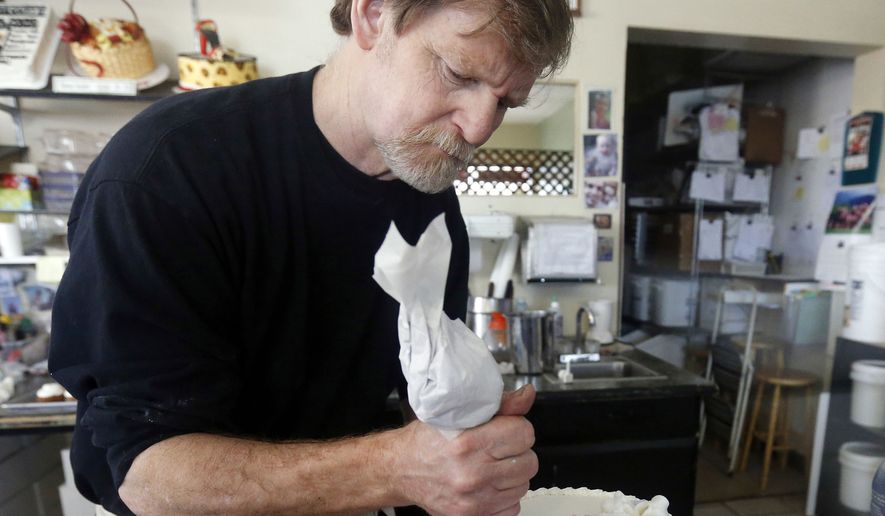OPINION:
Nowhere on the left end of the political spectrum is the call for “tolerance” more deceitful than among the organized sexually confused. Tolerance, Jonathan Capehart, a gay (but not very cheerful) editorial writer for The Washington Post, tells a television interviewer, should not be a two-way street. “It’s a one-way street.” Tolerance for me, but not for you.
Two years after the Supreme Court decreed in June 2015 that men and women have a constitutional right to tie a marital knot with someone of their own sex, the justices will hear a case Tuesday that will require them to decide whether the word “tolerance” means something beyond the court’s 5 to 4 ruling, steeped in cheap pathos, that marriage doesn’t mean what it has meant in every culture and every civilization for many centuries.
The target of the left’s intolerance in this case is Jack Phillips, owner of the Masterpiece Cakeshop in Lakewood, Colo. Mr. Phillips’ First Amendment right of free exercise of religion, of freedom of expression and of freedom of association, are on the line in Masterpiece Cakeshop Ltd. v. Colorado Civil Rights Commission.
The U.S. Justice Department has filed a friend-of-the-court brief in support of Mr. Phillips, as have 11 U.S. senators and 75 members of the House, together with state executive-branch officials in 20 states.
A devout Christian, Mr. Phillips declined seven years ago to design a custom wedding cake for two gay men in Colorado. Same-sex marriage was not legal there at the time, but they had planned to travel to Massachusetts for the ceremony, where such rites were within the law, and the men wanted have their cake and eat it when they returned.
Mr. Phillips cited his deeply held religious beliefs that marriage is a sacrament intended in universal Christian belief to be between a man and a woman. Rather than taking their business elsewhere, which they easily could have done, the plaintiffs Charlie Craig and David Mullins looked for a baker whom they could file a discrimination lawsuit against.
Mr. Phillips’ lawyers argued that designing custom wedding cake is an art and a form of creative expression deserving of First Amendment protection. To force him to create a custom cake for a same-sex wedding, they argued, would be akin to conscription into involuntary servitude and compelling expression with which he disagrees.
Mr. Phillips argued that wedding cakes should be exempt from public accommodation nondiscrimination laws, but neither the Colorado Civil Rights Commission nor the Colorado Court of Appeals agreed. The Colorado Supreme Court declined to take the case, but the U.S. Supreme Court did, and Mr. Phillips has a chance to recover 40 percent of his bakery’s sales that he has foregone rather than violate his conscience. Kristen Waggoner, who will represent Mr. Phillips before the high court, put the issue in a proper frame. “If we want freedom of expression for ourselves,” she says, “if we want the free exercise of religion for ourselves, then we have to support that right for others, even those we disagree with.”
A floral designer in Washington state, a photographer in New Mexico and a videographer in Minnesota, among others, will be watching this case with particular interest. By ruling for Mr. Phillips, the Supreme Court can undo collateral damage to the Constitution wrought by the Supreme Court decision finding same-sex marriage a constitutional right.




Please read our comment policy before commenting.